Research + Insights: Emerging Labor Models
In a survey conducted for the Fall 2023 People + Strategy journal, the SHRM Research team analyzed eight different emerging models of work and how they're being embraced by employers and employees.
?qlt=82&ts=1741789124366&dpr=off&fmt=png-alpha&bfc=on)
The Future of Work: Emerging Labor Models
To gain insights into the future of work, SHRM Research surveyed 962 U.S. workers and 1,106 HR leaders in August 2023. The study delved into eight emerging work models, each representing varying degrees of current and future templates. These models represent novel approaches to how and where work is conducted, as well as the integration of advanced technology. Many organizations will incorporate a mix of these models into their current (and future) policies. By evaluating these models, the research aimed to shed light on the potential evolution of work and to understand employees' perceptions of this evolution.
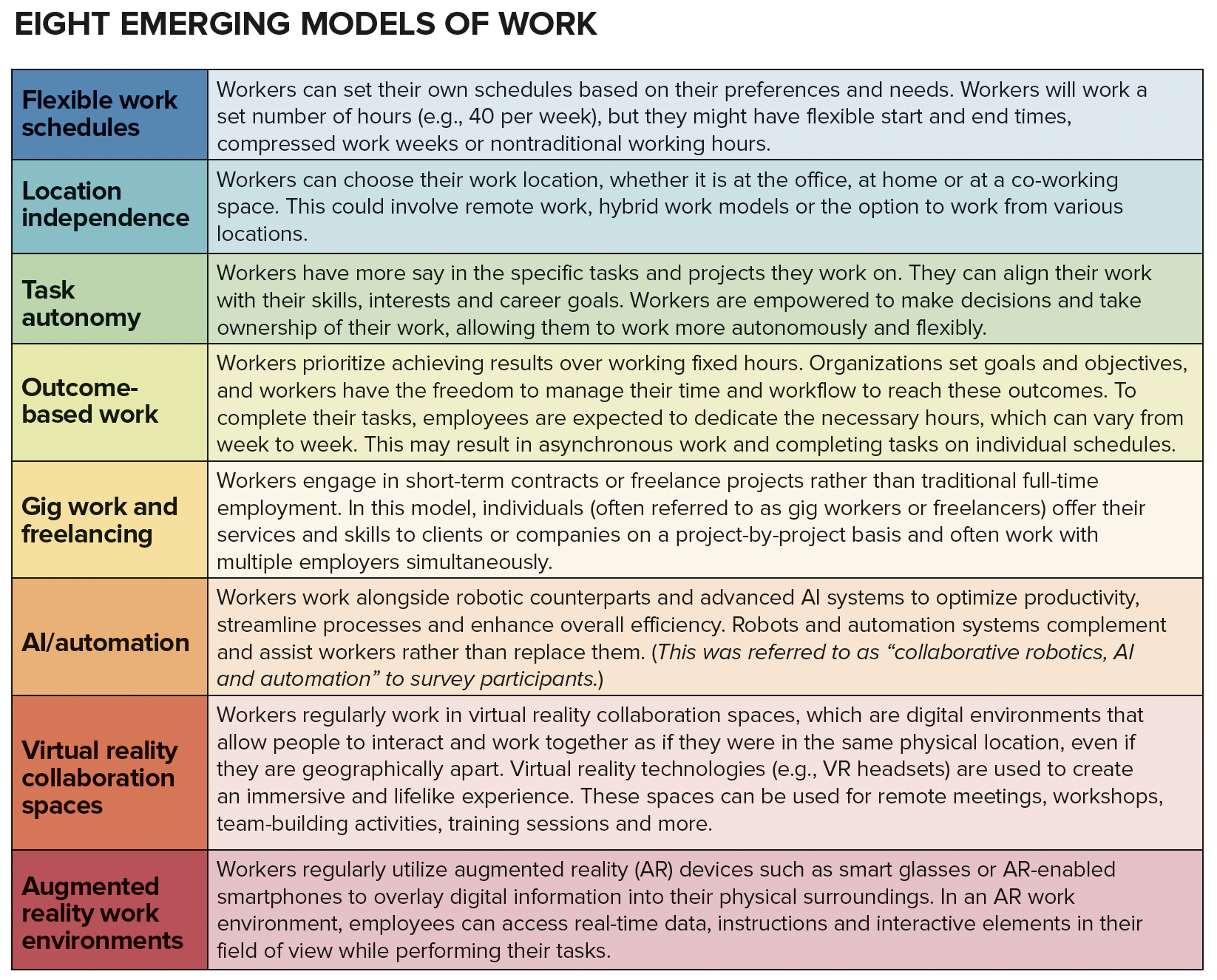
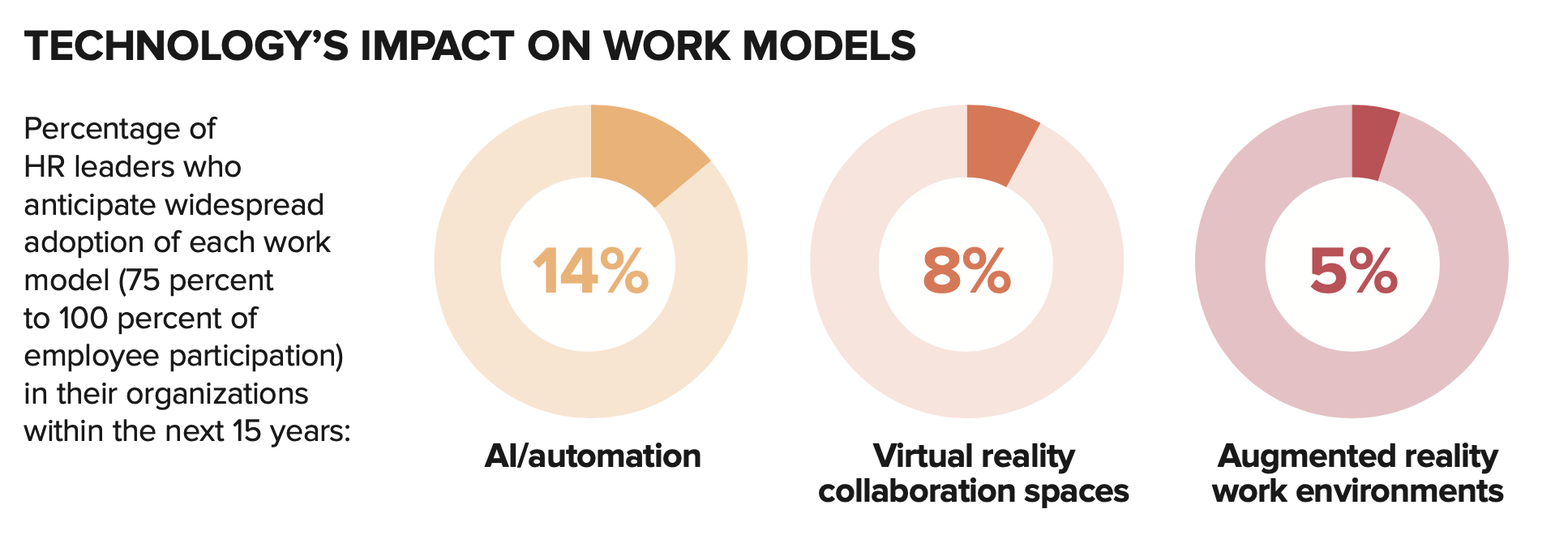
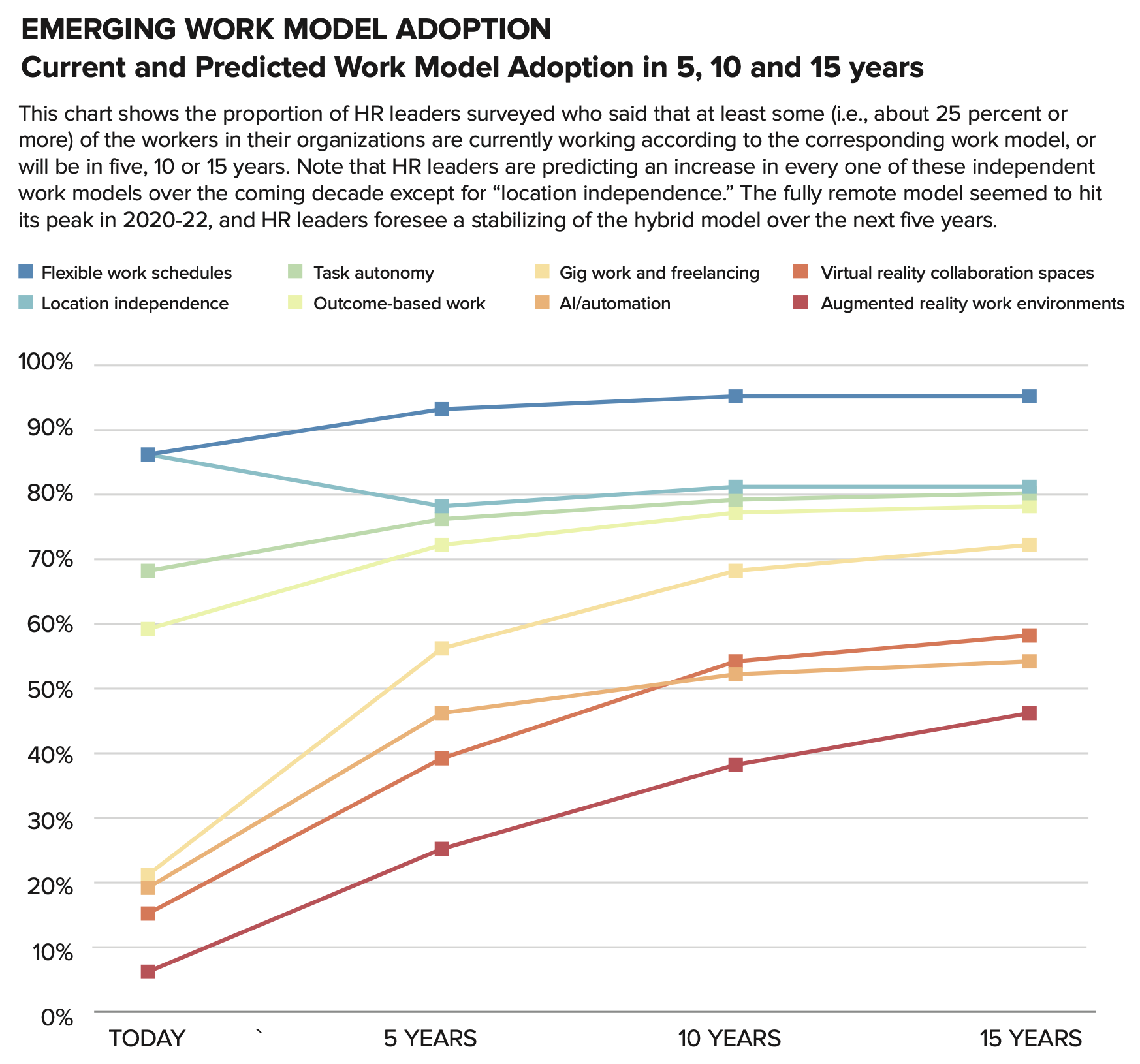
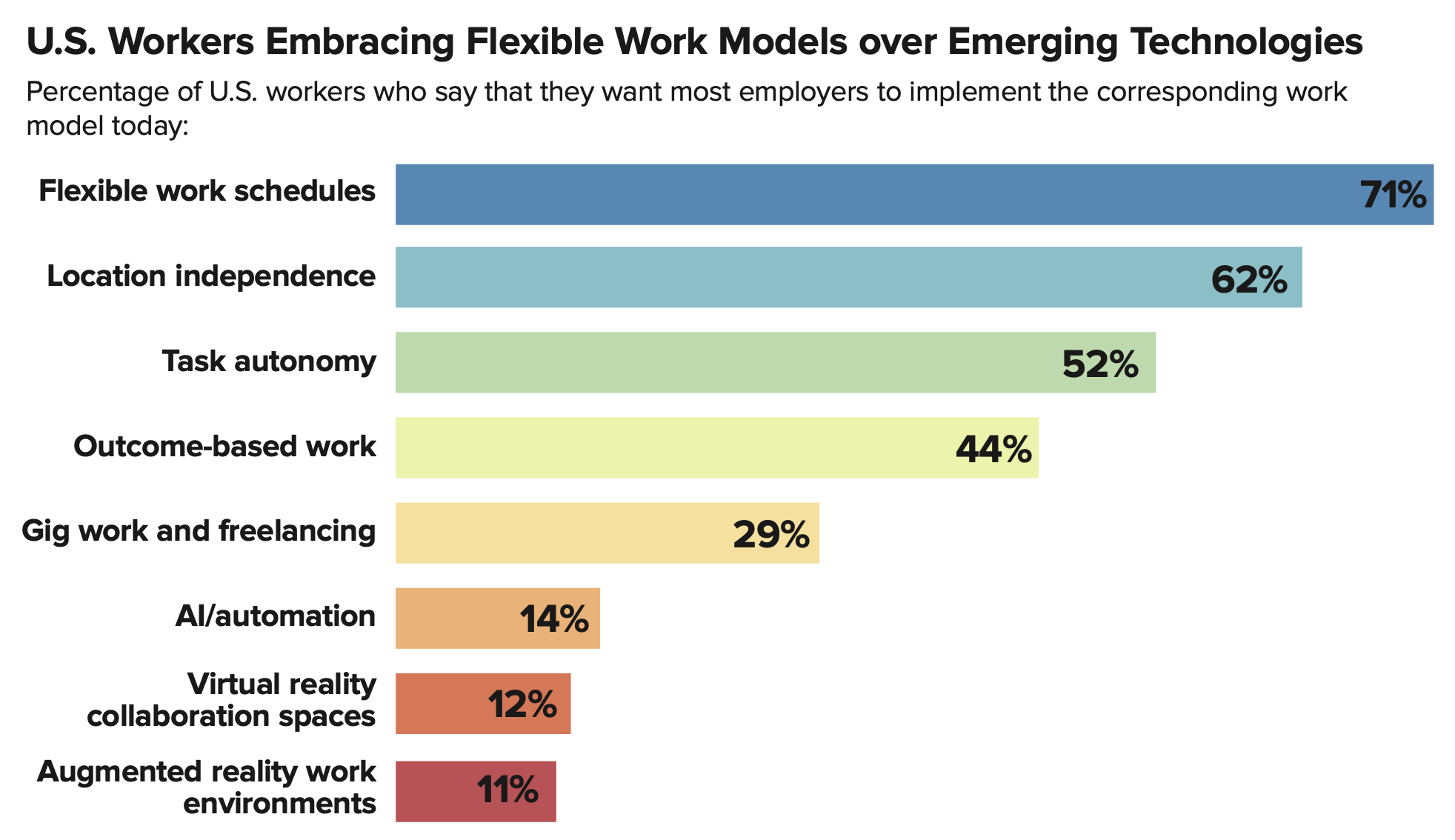
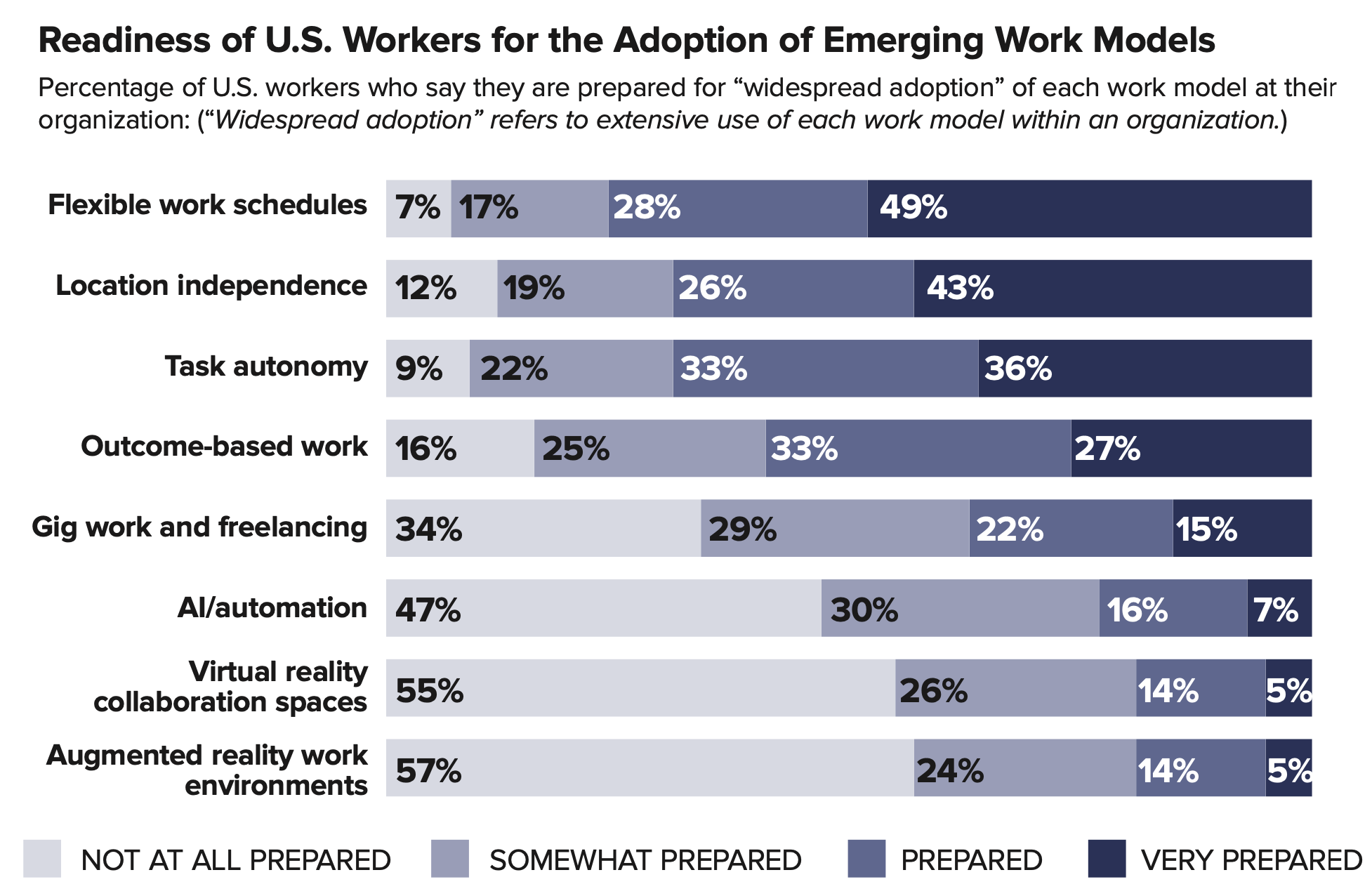
_________________________________
MESSAGE FROM THE SHRM RESEARCHERS
Navigating the New Abnormal:
Avoiding the Clash Between Future Demands and Present Perspectives
By Ragan Decker, Ph.D., and Daroon Jalil
In recent years, the world of work has experienced profound transformations, which has resulted in the emergence of novel work models. The shift toward flexibility has granted employees unprecedented autonomy in determining when, where and how they work. The integration of advanced technologies—such as AI, virtual reality and augmented reality devices has further catalyzed this evolution.
While this transformation holds great potential, it also brings to light ongoing tensions between U.S. workers and organizations over how work is being accomplished and how it will be accomplished in the future.
New SHRM research surveying HR leaders and U.S. workers delved into eight emerging work models, each representing varying degrees of futurism. The results suggest that the future success of organizations may hinge on their ability to meet employees' needs for flexibility while also pushing employees to adopt new technologies that many are currently apprehensive about.
Employees Seek Flexibility
Many organizations have already embraced work models centered around flexibility and autonomy, though to varying degrees. For example, more than half of organizations have adopted these work models to some extent (see chart above). However, the widespread adoption of flexible work models remains limited.
Only 23 percent of organizations have implemented flexible work schedules for a large majority of employees (about 75 percent or more). And fewer provide location independence (18 percent) or task autonomy (16 percent) to a large majority of their workforce.
HR leaders anticipate more widespread adoption of flexible models in the future, but it is not to the level that U.S. workers are seeking. Many would prefer most employers to immediately implement work models centered around flexibility and autonomy. What's more, U.S. workers overwhelmingly agree that the widespread adoption of flexible work schedules (86 percent), location independence (84 percent), and task autonomy (78 percent) would make them more likely to apply to an organization.
Less Interest in Engaging with Advanced Technology at Work
Conversely, employers' adoption of work models centered around technology advancements, like AI/automation, virtual reality collaboration spaces and augmented reality environments remains relatively limited. And workers aren't clamoring for these advancements.
Few workers say they would like most employers to implement these work models immediately. And about one in three employees say they would be less likely to apply to organizations that use these tech models extensively. Despite this, HR leaders anticipate a rise in adoption of these work models in the next five, 10 and 15 years, with a notable 51 percentage point increase in the adoption of AI/automation over the next 15 years.
Technology-based work models may deter employees due to job security concerns. Approximately 1 in 3 (35 percent) U.S. workers and 43 percent of HR leaders believe that widespread adoption of AI/automation will result in a decrease in the number of jobs their organization needs to achieve organizational objectives. On a personal level, 23 percent of U.S. workers are concerned their job will be replaced due to workplace automation in the next five years, according to SHRM's 2023 Workplace Automation Research.
While adoption of an AI/automation work model may elicit valid concerns of job displacement, only 1 percent of organizations currently have widespread adoption of AI/automation and only 12 percent anticipate widespread adoption within 15 years.
3 Smart Strategies
While U.S. workers might show reluctance in embracing emerging technologies, these innovations could enable organizations to enhance their capacity to provide the desired level of flexibility to their workers.
The adoption of virtual reality work environments can facilitate more location independence for employees. And workers can collaborate with AI/ automation to gain more autonomy in their work through the automation of certain tasks.
To this end, we recommend implementing the following strategies:
- Foster discussions on flexibility. To attract top-tier talent, it's important to initiate thoughtful discussions centered around flexibility. By addressing the evolving needs and preferences of the workforce, organizations can foster an environment that appeals to the most exceptional workers.
- Prioritize upskilling and reskilling. Organizations can adapt to changing work requirements using their existing workforce, while employees gain the opportunity to cultivate essential skills that ensure sustained value and competitiveness in the job market. This may also help mitigate potential resistance to emerging technologies among employees. In fact, 57 percent of U.S. workers are confident their organization could/can train them to use automation effectively on the job according to SHRM's 2023 Workplace Automation Research.
- Follow best practices in change management. Adopting new work models requires following change management best practices to address employee concerns, ensure effective communication and minimize resistance.
The give-and-take dynamic between employers' desire to adopt emerging technologies and employees' needs for flexibility plays a pivotal role in navigating the evolving landscape of work.
Ragan Decker, Ph.D., and Daroon Jalil are researchers at SHRM.
An organization run by AI is not a futuristic concept. Such technology is already a part of many workplaces and will continue to shape the labor market and HR. Here's how employers and employees can successfully manage generative AI and other AI-powered systems.



